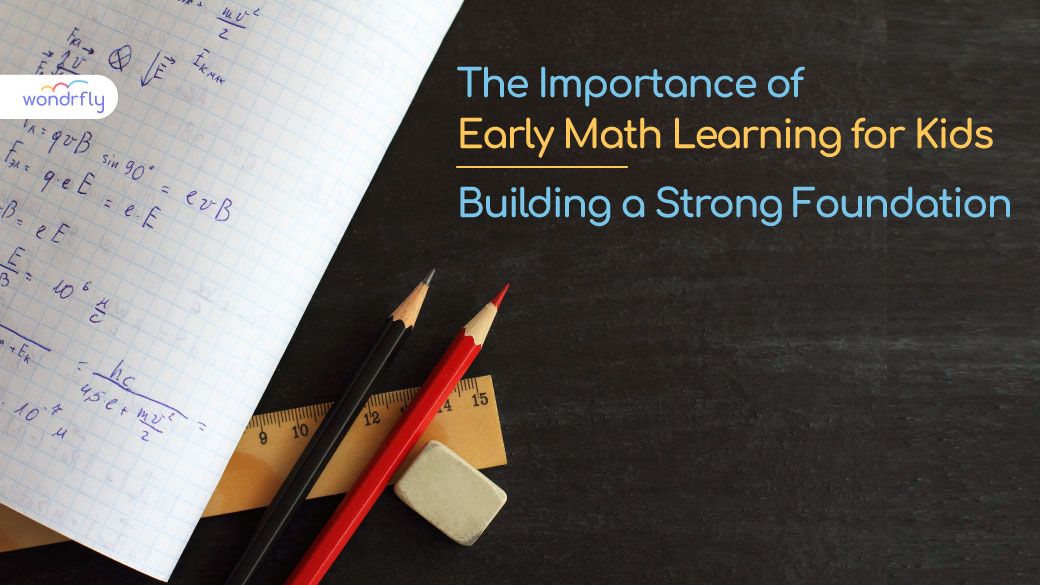Math – the language of numbers, patterns, and logic – is a cornerstone of academic success. While some may view mathematics as a subject best tackled later in a child's education, the truth is, early math learning for kids holds immense importance. Wondrfly is here to guide you through the benefits of early mathematics lessons and explore ways to nurture a love for numbers in your child!
In today’s competitive world, ensuring that children receive a robust education from an early age is essential. Among the various subjects, mathematics stands out as particularly crucial. Early mathematics courses for kids not only build a strong academic foundation but also foster critical thinking and problem-solving skills that are invaluable throughout life. So, know the significance of early math education and highlight how the best math classes can make a difference in a child’s development.
The Significance of Early Mathematics Learning
Early math learning for kids is more than just numbers and equations. It encompasses a wide range of concepts including shapes, patterns, measurements, and data analysis. Engaging children in mathematics from a young age helps them develop a natural curiosity about the world around them. Research has shown that children who receive quality mathematics courses education early on tend to perform better academically later in life. This early exposure helps in creating a positive attitude towards learning and builds confidence in their mathematical abilities.
The Seeds of Success: Benefits of Early Math Learning for Kids
Exposing children to math lessons at a young age offers many benefits that extend far beyond basic calculations. Early mathematics learning helps children develop:
-
Critical Thinking and Problem-Solving Skills: Math encourages logical reasoning and the ability to break down problems into manageable steps. These skills are essential in learning mathematics programs and in all learning areas.
-
Spatial Reasoning: The best mathematics programs often involve shapes, patterns, and spatial relationships. Early exposure to these concepts helps children develop spatial reasoning skills, crucial for activities like reading maps, visualizing objects in 3D, and understanding geometric principles.
-
Language Development: Mathematics vocabulary plays a vital role in early math learning. Counting, comparing, and classifying objects – all fundamental mathematics lessons– contribute to the development of strong language skills.
-
Confidence and Self-Esteem: Successfully mastering math lessons builds confidence and a sense of accomplishment in young children. This positive math lessons learning experience carries over to other areas of their development.
Planting the Seeds: Nurturing a Love for Math in Early Learners
Making math lessons learning fun and engaging is key to fostering a positive attitude towards the subject. Here are some ways to nurture a love for mathematics in young learners:
-
Transform Everyday Activities into Math Adventures: Turn everyday tasks into teachable moments. Counting groceries at the store, sorting laundry by color, or setting the table can all be transformed into fun math lessons.
-
Embrace Playful Learning: Games, puzzles, and interactive apps can make learning the best math programs enjoyable. Look for age-appropriate games that focus on counting, shapes, patterns, and basic addition and subtraction.
-
Read Math: Themed Stories: Children's books that weave math concepts into a story can make learning fun and engaging. These books can introduce basic mathematics program concepts like counting, measurement, and shapes while sparking a love for reading.
-
Incorporate Math into Everyday Routines: Encourage your child to participate in simple cooking activities like measuring ingredients. You can also incorporate math into playtime by counting toys, comparing sizes, or building structures with blocks.
Building a Strong Foundation: Exploring Best Math Classes for Kids
While early math lesson learning can begin at home, enrolling your child in the best math classes for kids can provide additional benefits. Here are some factors to consider when choosing a math program:
-
Age-Appropriate Curriculum: Look for mathematics programs specifically designed for your child's age group. These programs ensure that the concepts introduced are appropriate for their developmental level and learning style.
-
Playful and Engaging Approach: The best math classes for kids should make learning fun and engaging. Interactive activities, games, and songs can keep children motivated and interested.
-
Qualified Instructors: A passionate and qualified instructor can make a world of difference. Look for instructors who understand early childhood development and can create a positive math lesson learning environment.
Building a Future of Success: Investing in Early Math Learning
Early math learning for kids is fundamental in building a strong educational foundation. It equips children with essential cognitive and social skills, prepares them for future academic challenges, and fosters a lifelong love for learning. Investing in early mathematics classes is investing in the future of our children, paving the way for their success in a rapidly evolving world.
Early math program learning is a valuable investment in your child's future. By fostering a love for numbers and laying a strong math foundation, you're setting them on a path to academic success and lifelong learning. So, embrace the joy of mathematics exploration! With a little creativity and these tips from Wondrfly, a resource offering excellent math learning in New Jersey city, you can help your child build a strong mathematics foundation, brick by engaging brick!
